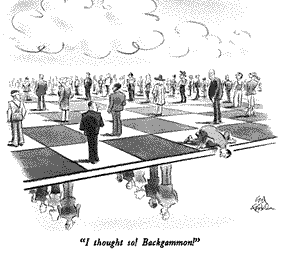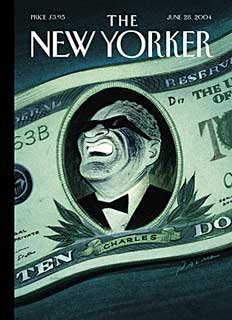Pi continued:
(see 9/15/04)

Above:
Renegade mathematician Max Cohen (Sean Gullette, left) and the leader of the Kabbalah sect, Lenny Meyer (Ben Shenkman) have a chance encounter on a Chinatown street corner.
The Magic Schmuck

"Confucius is said to have received only one inappropriate answer, i.e., hexagram 22, GRACE — a thoroughly aesthetic hexagram. This is reminiscent of the advice given to Socrates by his daemon — 'You ought to make more music' — whereupon Socrates took to playing the flute. Confucius and Socrates compete for first place as far as reasonableness and a pedagogic attitude to life are concerned; but it is unlikely that either of them occupied himself with 'lending grace to the beard on his chin,' as the second line of this hexagram advises. Unfortunately, reason and pedagogy often lack charm and grace, and so the oracle may not have been wrong after all."
— Carl Jung, Foreword to the I Ching
Yesterday, class, in keeping with our morning German lesson, our evening (5:01:22 PM ET) entry was Hexagram 22, Pi (pronounced "bee"). The Chinese term pi may be translated in various ways… As ornament, as adornment, or as in a German web page:
|
I-Ching 22
|
Pi
|
Der Schmuck
|
The Wilhelm translation of pi is "grace." This suggests we examine yesterday's evening lottery number in the State of Grace, Pennsylvania:
408.
As kabbalists know, there are many ways of interpreting numbers. In keeping with the viewpoint of Ecclesiastes — "time and chance happeneth" — let us interpret this instance of chance as an instance of time… namely, 4/08. Striving for consistency in our meditations, let us examine the lessons for…
4/08 2003 — Death's Dream Kingdom —
and 4/08 2004 — Triple Crown.
From the former:
"When smashing monuments, save the pedestals; they always come in handy."
— Stanislaw J. Lec
From the latter:
"The tug of an art that unapologetically sees itself as on a par with science and religion is not to be underestimated…. Philosophical ambition and formal modesty still constitute Minimalism's bottom line."
— Michael Kimmelman
In keeping with the above, from
this year's Log24.net
Rosh Hashanah service…
A Minimalist
Pedestal:
For a poetic interpretation
of this symbol, see
Hexagram 20,
Contemplation (View).





















